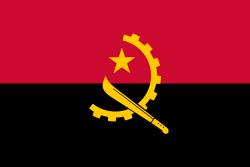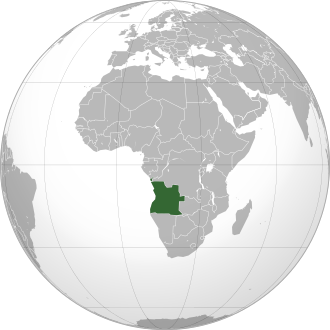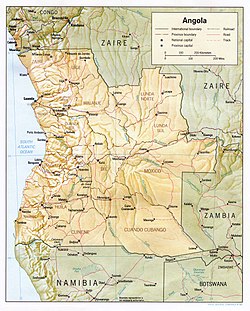Angola
Angola, officially the Republic of Angola, is a country in southern Africa. It shares borders with Namibia in the south, the Democratic Republic of the Congo in the north, and Zambia in the east. Its west border touches the Atlantic Ocean. Its coastline is 1600 kilometers. Angola's capital is Luanda. The country has many natural resources.[1][2] Angola is the seventh largest country in Africa. The capital and most populated city of Angola is Luanda.
Republic of Angola República de Angola (Portuguese) | |
|---|---|
| Motto: | |
| Anthem: | |
| Capital and largest city | Luanda 8°50′S 13°20′E / 8.833°S 13.333°E |
| Official languages | Portuguese |
| Ethnic groups (2000) | 37% Ovimbundu 25% Ambundu 13% Bakongo 21% Other African 2% Mestiço (mixed European and African) 1% Chinese 1% European |
| Religion (2015)[3] |
|
| Demonym(s) | |
| Government | Unitary dominant-party presidential constitutional republic under an authoritarian dictatorship |
| João Lourenço | |
| Bornito de Sousa | |
| Legislature | National Assembly |
| Formation | |
| 11 November 1975 | |
| 22 November 1976 | |
| 21 January 2010 | |
| Area | |
• Total | 1,246,700 km2 (481,400 sq mi) (22nd) |
• Water (%) | negligible |
| Population | |
• 2020 estimate | 31,127,674[4] (46th) |
• 2014 census | 25,789,024[5] |
• Density | 24.97/km2 (64.7/sq mi) (157th) |
| GDP (PPP) | 2019 estimate |
• Total | $208.034 billion[6] (64th) |
• Per capita | $6,850[6] (107th) |
| GDP (nominal) | 2019 estimate |
• Total | $124.600 billion[6] (61st) |
• Per capita | $4,101[6] (91st) |
| Gini (2018) | 51.3[7] high |
| HDI (2019) | medium · 148th |
| Currency | Kwanza (AOA) |
| Time zone | UTC+1 (WAT) |
| Driving side | right |
| Calling code | +244 |
| ISO 3166 code | AO |
| Internet TLD | .ao |
Angola is a member state of the African Union, the Community of Portuguese Language Countries, the Latin Union, South Atlantic Peace and Cooperation Zone and the Southern African Development Community.
History
Portugal built up its power in Angola from the late 15th to the middle 20th century. After independence there was a civil war from 1975 to 2002. Cuba and the Soviet Bloc supported the ruling People's Movement for the Liberation of Angola (MPLA). South Africa supported the insurgent National Union for the Total Independence of Angola (UNITA) until the end of apartheid. The war ended after the rebel leader Jonas Savimbi was killed.
Geography
Angola is the world's twenty-third largest country. Angola is bordered by Namibia to the south, Zambia to the east, the Democratic Republic of the Congo to the north-east, the Republic of the Congo via the exclave of Cabinda, and the South Atlantic Ocean in the west.
Climate
Angola's average temperature on the coast is 16 °C (61 °F) in the winter and 21 °C (70 °F) in the summer. It has two seasons; dry (May to October) and hot rainy (November to April).
Demographics
Angola had a population of 25,789,024 in 2014.[9]
Provinces
Angola is divided into eighteen provinces.
|
See List of settlements in Angola for the cities and towns in the country.
Angola Media
Angolan-National-Anthem- US-Navy-Band
King João I, Manikongo of the Kingdom of Kongo
Coat of arms granted to King Afonso I of Kongo by King Manuel I of Portugal
Depiction of Luanda from 1755
Portuguese Armed Forces marching in Luanda during the Portuguese Colonial Wars (1961–74).
Related pages
References
- ↑ "Angola". StateUniversity.com. Retrieved 3 March 2021.
- ↑ "Angola - The World Factbook". www.cia.gov. Retrieved 2021-03-09.
- ↑ "Angola". Association of Religion Data Archives. 2015. Archived from the original on 30 October 2020. Retrieved 18 May 2020.
- ↑ "Início". www.ine.gov.ao. Archived from the original on 2020-03-19. Retrieved 2020-04-18.
- ↑ Resultados Definitivos do Recenseamento Geral da População e da Habitação de Angola 2014 [Final Results of the General Census of Population and Housing of Angola 2014] (PDF) (in português), Instituto Nacional de Estatística, March 2016, archived from the original (PDF) on 6 May 2016
- ↑ 6.0 6.1 6.2 6.3 "Report for Selected Countries and Subjects: Angola". International Monetary Fund.
- ↑ "GINI index (World Bank estimate) - Angola". data.worldbank.org. World Bank. Archived from the original on 7 June 2019. Retrieved 22 March 2020.
- ↑ "Human Development Report 2020" (PDF). United Nations Development Programme. December 15, 2020. Retrieved December 15, 2020.
- ↑ "Resultados Definitivos Recenseamento Geral da População e Habitação - 2014" (PDF). Instituto Nacional de Estatística, República de Angola. Archived from the original (PDF) on 14 December 2019. Retrieved 3 May 2020.
Other websites
 Media related to Angola at Wikimedia Commons
Media related to Angola at Wikimedia Commons Angola travel guide from Wikivoyage
Angola travel guide from Wikivoyage









